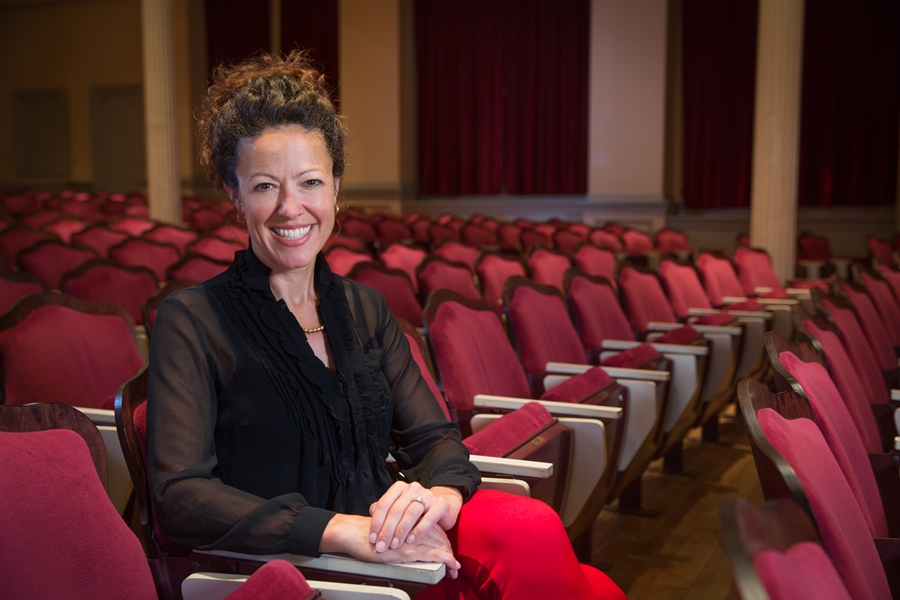Study Finds Majority of Public Is Unfamiliar With Ballot Measures
FAYETTEVILLE, Ark. – Political science researchers used a new approach to gauge the public’s knowledge of ballot measures and found that overall, fewer people have general knowledge of ballot measures than previously thought.
The survey also found that some people misrepresent their knowledge of issues on the ballot. The researchers’ results were published in Political Behavior.
Janine Parry, professor of political science at the University of Arkansas, worked with Jay Barth of Hendrix College and Craig Burnett of Hofstra University to analyze data through the Arkansas Poll, an annual poll of more than 800 Arkansans conducted by U of A researchers. Seventy-five percent of respondents identified themselves as “very likely” to participate in upcoming elections.
“Our measurement approach — which we contend is a more valid gauge of voters’ knowledge about such proposals — asked voters themselves to identify the measures purportedly motivating them,” the researchers explained. “Most failed. We suspect that when asked by past researchers if they had ‘read or heard about Proposition X,’ most voters said ‘yes’ not because a robust policy discussion brought the matter to their attention, but because affectively ‘yes’ is the correct answer.”
The researchers found that around half of the people surveyed in 2014 and 2016 expected to see issues on upcoming ballots, and even fewer could recall one or more specific measures. The researchers also found that respondents with higher levels of education, political interest and knowledge of national politics were the most likely to claim they knew of ballot measures without being able to name any specific measures.
Similar polls have found that between 64 and 75 percent of respondents were familiar with ballot measures. However, in those polls, respondents were simply asked to answer yes or no to questions about specific ballot measures. In the Arkansas Poll, respondents were first asked whether they were aware of any ballot measures in the upcoming election. If they answered yes to that question, they were then asked which measures were of particular interest to them.
These questions allowed the researchers to measure how many respondents had actual knowledge of ballot measures, and it gave insight into the number of respondents who misrepresented their amount of knowledge — answering yes to the first question, and then being unable to come up with a specific ballot measure.
In 2014, 46 percent of respondents claimed to know of initiatives or referendums on the upcoming ballot, but only 30 percent of the respondents could name one of the five measures. In 2016, 49.2 percent claimed knowledge of ballot measures, but only 23 percent of all respondents could name at least one. In both years, the number of respondents who were familiar with all the measures on the ballot was less than 1 percent.
The poll also included measures of education, political knowledge and interest in politics. When researchers took these into account, they found that people with lower levels of education and political knowledge and interest were more likely to report that they were not aware of any ballot measures. Respondents with higher levels in these areas were more likely to demonstrate knowledge of ballot measures, but they were also more likely to claim they knew of ballot measures without being able to name any specific measures.
About the J. William Fulbright College of Arts and Sciences: Fulbright College is the largest and most academically diverse unit on campus with 19 departments and more than 30 academic programs and research centers. The college provides the core curriculum for all University of Arkansas students and is named for J. William Fulbright, former university president and longtime U.S. senator.
About the University of Arkansas: The University of Arkansas provides an internationally competitive education for undergraduate and graduate students in more than 200 academic programs. The university contributes new knowledge, economic development, basic and applied research, and creative activity while also providing service to academic and professional disciplines. The Carnegie Foundation classifies the University of Arkansas among only 2.7 percent of universities in America that have the highest level of research activity. U.S. News & World Report ranks the University of Arkansas among its top American public research universities. Founded in 1871, the University of Arkansas comprises 10 colleges and schools and maintains a low student-to-faculty ratio that promotes personal attention and close mentoring.
Topics
Contacts
Janine Parry, Professor of Political Science
J. William Fulbright College of Arts and Sciences
479-409-0968,
parry@uark.edu
Camilla Shumaker, director of science and research communications
University Relations
479-575-7422,
camillas@uark.edu
Headlines
U of A Bands to Hold Three Nights of Concerts
The Symphonic Band, the Wind Symphony, the 4 O'Clock and 5 O'Clock Bands and the Wind Ensemble will perform April 21-23 at the Faulkner Performing Arts Center on the U of A campus.
Honors College to Host 'Best in Show' Dog Celebration
The campus and community are invited to celebrate our furry friends with popsicles, water and dog treats from 3-4 p.m. Thursday, April 25, in the Gearhart Courtyard.
New Parasite Affecting Canadian Partridges Named for Arkansas Poultry Scientist
A long-time colleague in Canada gave a newly found parasite the scientific name Eimeria hargisi in honor of U of A poultry science researcher Billy Hargis.
U of A School of Law Student Selected for Ms. J.D. Leadership Academy Intensive
Tristan Branstetter-Thomas, a second-year law student, was one of 30 students from across the country chosen to participate in the leadership academy at the Northwestern Pritzker School of Law in Chicago.
Needy Honored as Distinguished Alumna of University of Pittsburgh Engineering College
College of Engineering Dean Kim Needy was among seven alumni of the University of Pittsburgh Swanson School of Engineering honored in April as part of the 2024 Class of Distinguished Alumni.





